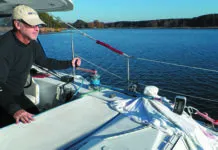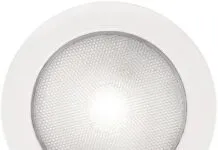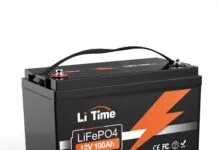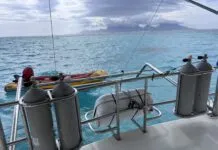Ghosting along in a bit of breeze, everything silent except for that hiss and burble of bubbles polishing the counter—that’s one of the powerful allures of sailing.

But when the wind retires and the water turns into a huge sheet of stainless steel, you must sing out, “Engine room, Bridge here.”
And with a turn of a key, that noisy, smelly Beast-in-the-Bowels rattles its bones, chuffs out a puff of smoke, and goes dutifully to work.
That’s when you appreciate the perseverance of Rudolf Christian Karl Diesel, who in 1893 built the first engine that came to bear his name. He first used coal dust as fuel, but blew out a brick wall in his shop and almost killed himself. He recovered, got backing from Friedrick Krupp, and made a fortune, but died somewhat mysteriously in 1913 as the European nations jostled for position prior to World War I.
Reliable, powerful and long-lasting, diesel engines did not replace the famous Atomic Four gasoline engines (and the occasional Gray Marine) aboard sailboats until the 1970s and even the ’80s. That’s when the diesels became small and light enough to be practical in sailboats.
Much of the credit for making small diesels goes to a onetime farm boy, Clessie Cummins, who fell rich in about 1920 when the introduction of his “lightweight” engines coincided with the nation’s first energy crisis.
Diesels in boats work hard. And everyone expects them to be devoted to duty—unfailing, infallible, and up to any challenge. They’ll do that, too, as long as the master is meticulous about clean fuel, proper lubrication, and adequate cooling.
So, which makes of diesel engines best do the job? It’s a daunting question, because diesels enjoy a reputation for reliability and durability that shames the finest gasoline engine ever built.
Practical Sailor went looking for answers among those who should know—the mechanics who must fix these engines when they fail.
There are a couple of dozen diesel engine manufacturers, including familiar names like Alaska, Bukh, Caterpillar, Cummins, Deere, Faryman, Izuzu, Lehman, Lister-Petter, Mann, Nanni and Vetus. Despite being mentioned occasionally by the mechanics, we left those names out of contention in the survey and stuck primarily to Perkins, Volvo, Westerbeke, Universal, and Yanmar, because these are the makes so often used in sailboats. We also asked the mechanics to limit their considerations to small engines—from around 15 to 50 hp.
The mechanics, lead mechanics, and mechanic supervisors whose opinions were sought were found in several groups (one big group was like a boisterous town meeting) plus independent mechanics. Some were interviewed in the morning or during their coffee breaks, others as they ate lunch, and a few in pleasant gams on the docks between jobs.
Almost all of the mechanics interviewed worked for shops that are dealers for at least one type of engine, but there were enough variables involved that we didn’t try to compensate mathematically for their (presumed) vested interests. Instead we surveyed enough mechanics that the interests would be balanced. In the long run it didn’t seem to matter anyway—all the mechanics had hands-on experience with all the makes of diesels, and in fact there was remarkably close agreement across the board on the ratings.
The first visit, a virtual homage call, was to Gordon Murphy, known in New England and beyond as a consummate diesel doctor. Murphy, 69, is the resident diesel wizard on Goat Island in Newport, RI. He and Ken Simas, 56, his only employee (they’ve worked together for 32 years) have seen it all.
“Most diesels, big or small, are pretty good these days,” Murphy said. “It’s a good thing they are, too, because what’s gone to hell in the past several years is the availability and cost of parts.”
“You can’t get anybody, anymore, to do what they say they’re going to,” said Murphy, who once was widely-known for his bad temper and still is for his intolerance of shoddy workmanship. “It’s hard to find anyone who handles what you need. The parts have two or three part numbers, and when you do find what you need, the stuff is ridiculously priced.”
He said Volvo is particularly difficult to deal with, adding as examples:
“They stick you $470 for an oil cooler that otherwise might cost maybe fifty or sixty bucks. Volvo gets five or six hundred dollars for a simple water pump.”
He said he knows, from more than one experience, another highly regarded European diesel manufacturer that bought Fram filters, sprayed the body with its own company color, and charged four times what Fram does.
Diesel mechanics in our survey indicated that, in their collective view, Perkins is the best small diesel. It ranked first in five categories, including the important categories of reliability and durability.
Perkins’ signature marine engine, the 4-108, is no longer made. That olde English company is now owned by Caterpillar Diesel in the US. Their marine engine division is Perkins-Sabre, which is represented in the US by Penske, the automotive conglomerate out of Detroit. Several mechanics were quite forthright in their dismay over this arrangement. One said that when Penske took over in the US, “everything went to hell for Perkins.”
Another lead mechanic said Penske “hasn’t got Perkins back up to the position it had when it was making the 4-108.”
Another said, “Perkins parts distribution is terrible, and they have nobody who knows anything about what you need.”
Perhaps ominously, Perkins suffered a poor rating only in the “parts availability” category.

Ranked second by the mechanics was Westerbeke, a good, solid engine that outranked Perkins in a few categories. Most important was the mechanics’ view that Westerbekes are very smooth-running engines.
Westerbeke also enjoyed a good return on its careful work to make parts available (the company ranked first in that category) and relatively inexpensive.
Ranked third was another old reliable, Universal. Universal was once the maker of the famed Atomic 4 marine gas engine. They made 155,000 of them up in Oshkosh, Wisconsin, and thousands of them are still plugging away. The last Atomic 4 went out the door in 1985. Universal makes a couple of diesels, including the M-25XPB, as drop-in replacements for the Atomic 4, and this has done much to keep the name alive.
Universal, now owned by Westerbeke, enjoyed not a single first-place rating in the 10 categories. But it hung right around the middle all the way.
In the final rankings, Volvo might be said to be a special case. Without its miserable showing in two categories— “low-cost parts” and “easiest to work on”— Volvo would have ranked very close to the second-place Westerbeke.
Volvo has for years been widely known (or reviled) for the truly outlandish price tags on both its marine and automobile engines. If you lack good fortune and need a major repair, Volvo parts will make you weep.
Coming last in the view of the mechanics surveyed was Yanmar. A considerable success story in its entry into the marine markets more than two decades ago, and now a formidable occupant of a position envied by other diesel makers, Yanmar has greatly improved its engines. No longer are they known as “Yammering Yanmars” that vibrated so violently that they broke standard engine mounts.
Practical Sailor has generally had very positive experiences with Yanmar diesels (despite the noise), and we wonder how much of the mechanics’ relatively negative response to these engines stems from the track record of early models shipped out of Japan. There’s no question that a brand name can suffer for years because of a poor start in the market, and this may be what happened in this survey. Mechanics, in our experience, have long memories, and can hold a grudge.
Clearly, boatbuilders feel differently—Yanmars are probably the most-often installed engines in new production boats, and have been for some years. This begs the question: Could Yanmars be in less favor with these mechanics simply because more of them come under mechanics’ care than other engines? We don’t know. All that can be reported here is that Yanmar was rated easiest to work on, and had the silver-medal cooling system. Otherwise it ranked poorly.
Happily, as was said by the veteran mechanic, Gordon Murphy, all diesels are quite reliable, which is surprising considering the heat and pressures involved.
The Tough Life of a Diesel
An automobile engine has a relatively easy job. It is, of course, expected to get you moving quickly. Any automotive engineer will tell you that your car’s engine probably would last almost forever (and could be much smaller) if we didn’t demand that our cars go from zero to 60 in a manner that delights tire manufacturers. Once your car engine has you moving and needs to deal with only a bit of ground friction and air resistance, it can hum along almost effortlessly… But then you demand fast acceleration and very high top-end speed.
Not true with a marine engine. It never gets to loaf. Any engine installed in a boat, especially a displacement sailboat, must be a brute with big muscles and a strong desire to sweat ceaselessly. It is, in effect, accelerating all the time. That’s because for each waterline length the displacement boat moves, the engine must move a volume of water equal to the boat’s weight. That’s a lot of water—on a full day of motoring in a calm, a diesel aboard a typical cruising boat might move 25,000 tons of the stuff.
Diesels are a lot lighter than they used to be, but they’re still heavier than gasoline engines. They also take up more space and are more expensive to buy and to repair.
However, because diesels are long-lasting, powerful, reliable (they need no elaborate electric ignition system) and (perhaps paramount in many boat owners’ eyes) use sparingly and efficiently a fuel that doesn’t explode, they are and undoubtedly will continue to be the engine of choice for sailboat owners.
Use your diesel hard. It’s built to work that way. Give it nothing but clean fuel. Change the oil as specified. Keep a close eye on the temperature. And remember—it’s an auxiliary. That means it’s there to help the sailplan, not replace it.
Contacts— Perkins Engines Company Ltd.,Frank Perkins Way, Eastfield, Peterborough PE1 5NA, UK 011 +44 (0) 1733 583000, www.perkins.com/. Volvo Penta of the Americas, Inc.,1300 Volvo Penta Dr., Chesapeake, VA 23320-9860, 757/436-2800, www.dieselnet.com/. Westerbeke Corporation (and Universal Diesels), Myles Standish Industrial Park, 150 John Hancock Road, Taunton, MA 02780-7319, 508/588-7700, www.westerbeke.com/. Yanmar Diesel America Corp., 951 Corporate Grove Dr., Buffalo Grove, IL 60089-4508, 847/541-1900.
Also With This Article
Click here to view “Diesel Engines: Mechanics’ Ratings.”
Click here to view “Diesel Scuttlebutt.”

































Has the been a review of OUTBOARD DIESEL engines 10 to 50 horsepower?
I haven’t seen one, and i doubt we will. They have their merits but are still a rarity. Between my marina and 2 clubs there isn’t a single one.
Please let me know if you’re looking for a article writer for your site. You have some really good articles and I think I would be a good asset. If you ever want to take some of the load off, I’d really like to write some material for your blog in exchange for a link back to mine. Please blast me an e-mail if interested. Kudos!
Good article
I and also my friends came looking through the great helpful hints on your website and then at once got a terrible feeling I had not thanked you for those secrets. These young men were definitely so very interested to see them and now have truly been taking pleasure in these things. Thank you for indeed being simply considerate and for selecting this sort of incredible ideas millions of individuals are really needing to be aware of. Our own sincere apologies for not saying thanks to earlier.
With every little thing that appears to be developing inside this subject matter, many of your opinions happen to be quite stimulating. Having said that, I beg your pardon, but I do not give credence to your whole strategy, all be it exciting none the less. It looks to everybody that your comments are generally not completely rationalized and in simple fact you are generally yourself not completely confident of your argument. In any case I did appreciate reading through it.
I want to get across my respect for your kindness giving support to men and women that require guidance on this important theme. Your very own commitment to passing the solution all through was certainly insightful and have truly made workers just like me to reach their aims. Your new warm and friendly tips and hints entails a whole lot to me and still more to my peers. Warm regards; from each one of us.
With havin so much content do you ever run into any issues of plagorism or copyright infringement? My blog has a lot of completely unique content I’ve either created myself or outsourced but it appears a lot of it is popping it up all over the web without my permission. Do you know any techniques to help stop content from being stolen? I’d certainly appreciate it.
As I site possessor I believe the content matter here is rattling wonderful , appreciate it for your hard work. You should keep it up forever! Best of luck.
I do love the way you have framed this specific concern and it does give me personally a lot of fodder for thought. Nonetheless, through what precisely I have experienced, I basically wish when the actual feed-back stack on that folks stay on point and not get started on a tirade regarding some other news du jour. All the same, thank you for this fantastic piece and whilst I can not really concur with this in totality, I respect the viewpoint.
Great write-up, I am normal visitor of one’s website, maintain up the excellent operate, and It is going to be a regular visitor for a long time.